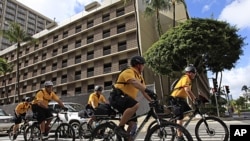Senior officials from 21 countries are meeting in Hawaii this week for the annual summit of the Asia Pacific Economic Cooperation forum, or APEC. This year's host, President Barack Obama, will meet with other Asia-Pacific leaders Saturday and Sunday.
Security is in force in Honolulu, as 10,000 people gather for the summit, including national leaders, government ministers, business executives and reporters.
This year the United States hopes to expand trade and coordinate regulations in the Pacific region and announce a framework for the so-called Trans-Pacific Partnership, a Pacific free trade zone. It would be built on an existing trade agreement involving Brunei, Chile, New Zealand and Singapore.
American negotiators are spearheading the effort to expand the partnership to include the United States, Australia, Malaysia, Peru and Vietnam. Japanese farmers and fishermen rallied Tuesday against the possible involvement by their nation after news reports said Prime Minister Yoshihiko Noda will soon announce that Japan will join the talks.
The United States is urging restrictions on subsidies to state-owned enterprises, which would have an impact on China, whose mixed economy is making the transition from state ownership to private enterprise. A Chinese official said this week that China has not been asked to join the free trade partnership.
Political scientist Christopher McNally of the East-West Center says the U.S. Congress would probably not approve the agreement if China were included, at least for now. But Vietnam has joined the talks, and he notes that Vietnam is making the same transition. He says APEC is a good forum to reach limited agreements that involve only some of the member nations.
“It's a venue where leaders can get together to discuss facilitation of trade, investment and other economic issues within the Asia-Pacific. But, agreements that are binding tend to be forged at a smaller level because it's very difficult to get all 21 economies to agree on one issue,” noted McNally.
American officials, including Secretary of State Hillary Clinton, are asking APEC nations to reduce tariffs on environmentally sustainable goods and services, including wind turbines and solar power panels.
China has said the U.S. goals are too ambitious and are beyond the reach of developing countries. Analyst McNally says American trade agreements are more complex than China's and typically deal with issues other than trade.
“They also include environmental standards, they include labor standards. The include also product standardization, things like that," said McNally.
He says Chinese agreements focus on such basic issues as reducing tariffs and quotas and harmonizing customs standards.
Both kinds of issues will be tackled in meetings at successively higher levels. President Obama will host the APEC leaders at a dinner Saturday, and the summit will wrap up with a meeting of the leaders Sunday.




